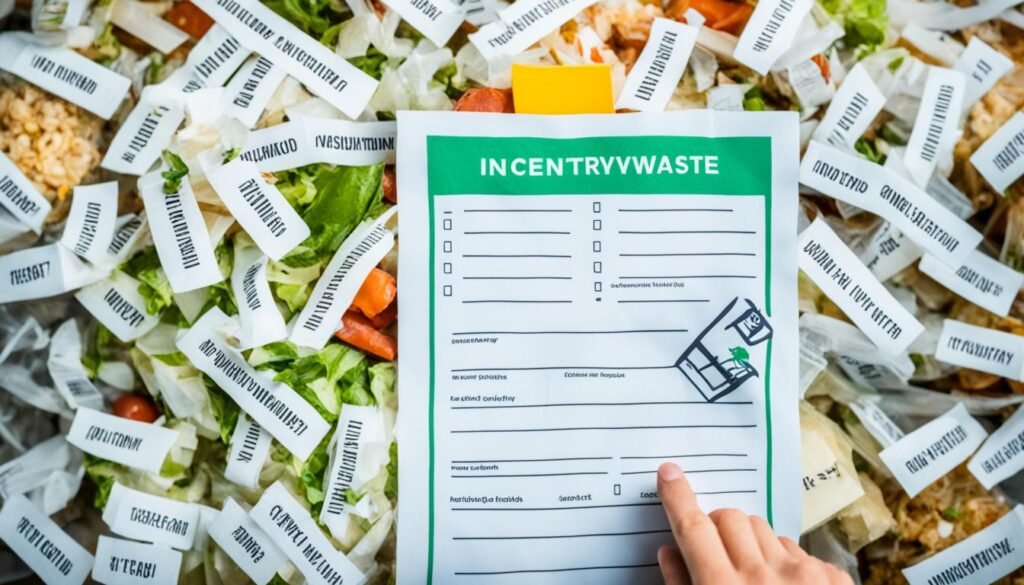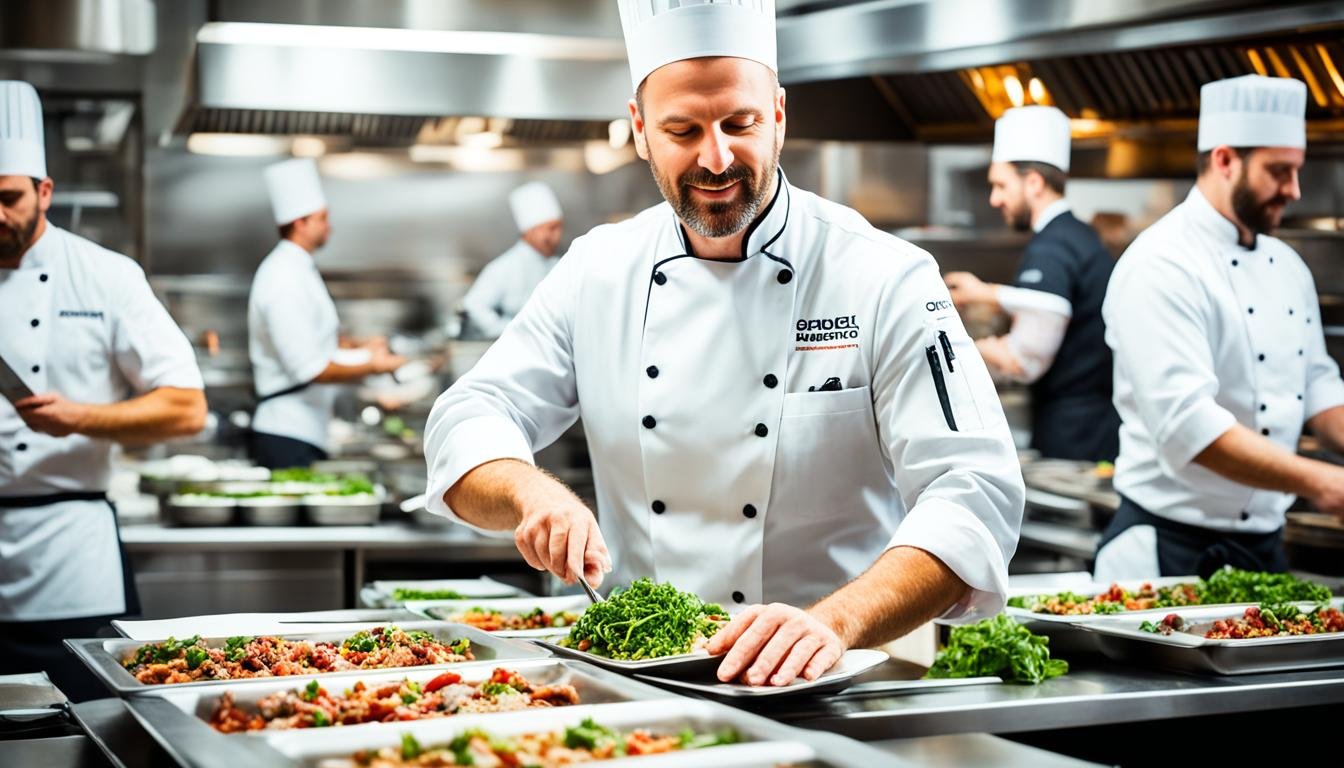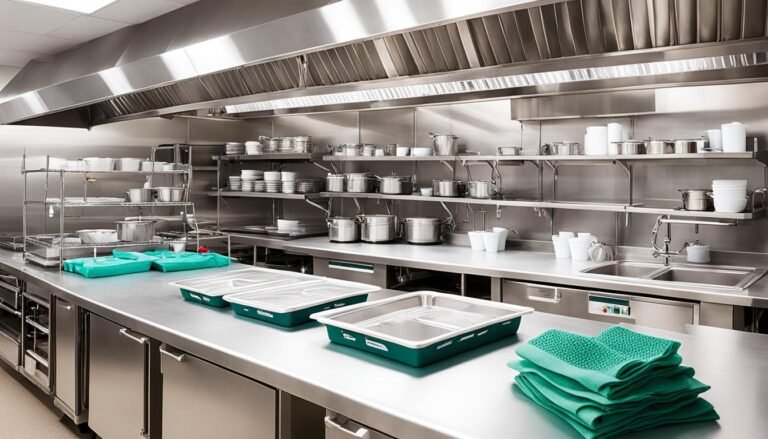Essential Guide to Introduction to Restaurant Management
Do you love food and dreams of owning a restaurant? Then, getting into restaurant management could be perfect for you. It’s an exciting journey.
Managing a restaurant is not just about day-to-day tasks. It’s about making dining unforgettable, leading a skilled team, and ensuring the business makes money. This guide is your key to success, whether you’re new or an experienced pro in foodservice.
Here’s a story to show why knowing the basics of restaurant management is crucial:
Picture this: You’re out with friends at a restaurant. The place feels great, the food looks amazing, and you’re eager to eat. But, things go south. The service is slow, the staff are all over the place, and your food is late. Your good mood disappears, and you swear not to come back.
This bad night out shows how vital good restaurant management is. It’s about offering great service and smooth experiences. Proper management covers everything from operations to how the staff are trained.
Key Takeaways:
- Restaurant management means handling every part of the business, from making food to dealing with customers and money.
- Being a good restaurant manager needs leadership, organization, and problem-solving skills.
- There are chances to learn more and improve your restaurant management skills through training.
- Top tips in restaurant management include focusing on customer service, ensuring food is safe, and being eco-friendly.
- With the right practices, you can lead a successful and profitable place.
The Responsibilities of a Restaurant Manager
A restaurant manager is vital for a dining place to run well. They handle many areas, mainly admin and tasks that happen daily.
Administrative Responsibilities
Managing a restaurant requires a lot of work behind the scenes. This includes keeping costs in check and making sure the business is well-promoted. Key admin tasks are:
- Cost Control: Keeping an eye on expenses, managing budgets, and finding ways to increase profits.
- Contract Management: Making sure vendor agreements are followed and everything runs smoothly.
- Marketing: Creating and putting into action ads and other promotions to draw in and keep customers.
Operational Responsibilities
Operational duties cover everything needed for the restaurant to function. This ranges from the staff to the kitchen, ensuring all work together for a great dining experience. Main operational tasks are:
- Staff Management: Bringing in, training, making schedules for, and supporting all staff members.
- Customer Service: Making sure guests are happy by talking with them, meeting their needs, and solving any problems.
- Quality Control: Checking on the food’s quality, watching the kitchen, and setting standards to meet what customers want.
- Inventory Management: Controlling stock, keeping track of items, and making sure nothing goes to waste.
Restaurant managers have to handle both admin and operational tasks. They often need to do several things at once. Doing well in these areas is key to the place’s success.
| Administrative Responsibilities | Operational Responsibilities |
|---|---|
| Cost Control | Staff Management |
| Contract Management | Customer Service |
| Marketing | Quality Control |
| Inventory Management |
Being a great restaurant manager means having top skills in organization, leadership, and solving problems. They must be good at managing both admin work and daily operations.
Hiring and Managing Staff: Prioritizing Your People
Being a restaurant manager means handling the restaurant staff management very well. The success of your place depends a lot on the team. To ensure you have the best team, create a good vibe at work. Train your staff and let them know you appreciate them. This way, your restaurant can shine by offering great service and making customers happy.
Creating a Positive Work Environment
It’s key to have a happy, productive team. To achieve this, managers need to encourage everyone to talk and work together well. This kind of atmosphere makes people feel valued. They then work harder to do a great job.
“A positive work environment cultivates a happy and engaged workforce, leading to better customer experiences.”
Employee Training
Training your staff well is crucial. They need to nail their jobs, from talking to customers to keeping food safe. Offering good training makes your team confident in any situation. And that means they can give great service every day.
Employee Recognition
It’s important to thank people for their hard work. Set up awards and give out notes or praise in front of others. These things let your team know they’re doing a great job.
Maintaining a Healthy Work Atmosphere
Fixing problems at work should be done with care, not by being too strict. If someone’s not doing well, help them do better. Give advice and be a good role model. This way, your team continues to get better at what they do.
“A healthy work atmosphere promotes employee well-being, job satisfaction, and loyalty.”
| Benefits of Prioritizing Your Staff | Improved customer service | Better employee retention | Increased employee morale |
|---|---|---|---|
| Creating a positive work environment | Ensures a pleasant dining experience for customers | Reduces employee turnover and related hiring costs | Fosters a sense of pride and loyalty among employees |
| Employee training | Enhances product knowledge and service quality | Develops a skilled and competent workforce | Increases confidence and job satisfaction |
| Employee recognition | Boosts motivation and engagement | Instills a sense of appreciation and value | Encourages continued dedication and excellence |
| Maintaining a healthy work atmosphere | Improves teamwork and collaboration | Reduces conflicts and promotes positive relationships | Supports employee well-being and job satisfaction |
Customer Service: Give Them a Reason to Come Back
A restaurant’s success is tied to great customer service. As a manager, you play a vital role in this. Being positive and attentive helps customers feel welcome and valued. This inspires them to return.
Being on the floor during service lets you see things from the customers’ view. Talking to them shows you care about their satisfaction. Listen, answer questions, and solve problems with your expertise quickly and politely.
Happy customers often come back. Make sure everything, like clean tables and cozy seats, adds to their delight. Little details and a friendly welcome are key to their happiness.
It’s also crucial to guide your team to offer top-notch service. Make a culture of hospitality and customer focus. Help staff polish their people skills to make guests feel at home. Give them regular feedback and praise for a job well done. This keeps the service level high.
“Good customer service is the lifeblood of any business.” – Paul Byrne
Every customer offers a chance to impress. Satisfied guests tend to recommend you or write good reviews. This can help your business grow. Keep bettering your service and dining experiences, which can lead to a loyal clientele. This is essential for your eatery’s lasting success.
Benefits of Effective Customer Service:
- Increased customer satisfaction and loyalty.
- Positive word-of-mouth recommendations.
- Repeat business and higher average check sizes.
- Enhanced reputation and online reviews.
- Opportunity for upselling and cross-selling.
Food Safety and Hygiene: Sanitation Is Paramount
Keeping food safe and clean is crucial for any restaurant boss. It includes following rules from groups like the FDA. Doing this stops issues, keeps people safe, and saves the place’s good name.
Adhering to Food Safety Standards
To keep their place safe to eat at, restaurants must be very careful. They train their team well on how to touch food, wash hands, keep food cold, and stop germs from spreading.
Managers have to know the rules and check everyone is following them. Staying up to date with rules helps them train their staff better, ensuring the food is always handled safely.
Preventing Violations and Reputational Damage
By focusing on safety, restaurant leaders can avoid big troubles. Breaking safety rules can hurt people or even close the place down, which is bad for its reputation.
“A single food safety violation can compromise the trust and loyalty of customers. It is essential for restaurant managers to take proactive measures to prevent violations and maintain the highest standards of food safety and hygiene.”
Staff Training and Compliance
Teaching the team how to handle food safely is key. They learn about keeping raw food safe, making sure it’s not too hot or too cold, and keeping their work areas clean.
| Food Safety Practices | Compliance with Standards |
|---|---|
| Regular inspection and maintenance of kitchen equipment | Ensure equipment is in compliance with safety requirements and functioning properly |
| Proper storage and labeling of food items | Implement strict inventory management practices and labeling protocols |
| Effective pest control measures | Collaborate with pest control professionals and implement preventive measures |
| Thorough employee hygiene practices | Train staff on proper handwashing, use of gloves, and personal hygiene |
By talking a lot about safety and always teaching their team, bosses create a place where safety comes first.
Financial Management: Running a Profitable Business
Running a successful restaurant requires effective financial management. This means controlling costs, optimizing menus, and making smart decisions to maximize profits. These efforts help ensure the restaurant’s long-term financial health.
Cost control is key. It means tracking and reducing expenses without sacrificing quality. This can be done by keeping a close eye on inventory, improving how you buy things, and making operations more cost-effective.
Menu engineering is a helpful strategy. It involves looking at what menu items are popular and make money. With this data, managers can adjust prices, portions, and recipes to boost revenue. A well-tailored menu attracts customers and increases profits.
Managing labor costs well is also essential. It involves scheduling staff efficiently, monitoring their work, and finding ways to work better. This helps avoid spending too much on staff.
Good accounting practices are crucial too. This includes keeping accurate financial records, using reliable systems, and checking financial statements often. These practices give managers a clear picture of the restaurant’s financial health.
Financial Management Best Practices
For better financial management, consider the following:
- Conduct regular financial audits to find ways to improve and fix issues.
- Set a budget and track actual spending against it regularly.
- Build strong relationships with vendors to get better deals.
- Use efficient inventory systems to cut waste and costs.
- Train staff on finances to help them save money.
- Keep up with trends and new tech that can help manage finances better.
Emphasizing sound financial management helps restaurants succeed in the long run. It reduces risks and paves the way for sustained profitability.
“Good financial management is the key to a thriving restaurant. It’s about finding the right balance between controlling costs, optimizing menu performance, and maximizing profits.”
Inventory Management: Preventing Spoilage, Spillage, and Shrinkage

Managing inventory well is key for a restaurant’s finances. With the right strategies in place, owners can cut down waste, keep track of what they have, and lower risks. This section looks at the best ways to manage your restaurant’s stock for better financial results.
Preventing Spoilage
Stopping food from going bad is a big task for restaurant managers. To keep food fresh and save money, consider these steps:
- Look at your menu often and swap out items that don’t sell well to lower spoilage risk.
- Use the FIFO method to use older food stock before it expires.
- Brainstorm with your cooks to find new ways to use up leftover ingredients.
Minimizing Spillage
Spills and waste are a big hit on your budget. To avoid spills and be more efficient, try this:
- Teach your team to handle food and drinks without spilling.
- Get spill-proof containers and storage to stop mishaps before they happen.
- Keep your kitchen tools in good shape to reduce accidents and waste.
Tracking Inventory
Keeping a close eye on what you have is crucial. Here’s how you can track your stock more efficiently:
- Use inventory management software to make tracking easier.
- Do stock checks often to catch any mistakes in your records.
- Organize your storage space for easy tracking and access.
Minimizing Losses
To protect your business from losses and theft, set up strict controls. Follow these steps:
- Use portion control to serve food in a way that minimizes waste.
- Teach your team about the importance of managing stock and cutting down on losses.
- Review your stock reports regularly to catch any issues early.
“Good inventory management makes a restaurant successful. By cutting waste, managing stock well, and reducing losses, you make your place more profitable. Remember, it’s an ongoing effort that needs constant attention.”
In wrapping up, managing your inventory well is vital for a healthy bottom line in your restaurant. By following the advice here, you can avoid food spoilage, cut down on spills, keep accurate stock records, and run a more efficient business.
Best Practices for Restaurant Management in 2023
Staying up-to-date with industry trends is key for success. Adopting best practices is a must. As we head into 2023, there are crucial areas for managers to focus on. This will ensure smooth operations and meet customer expectations.
Implementing Technology for Streamlined Operations
Using technology in daily operations makes everything smooth and improves customer experience. Advanced management software helps manage orders, inventory, and staff schedules. Platforms for ordering online and mobile apps make it easy for customers to get what they want. This boosts their satisfaction and loyalty. Technology also lets managers make decisions based on real-time data and solve problems before they grow.
“The use of innovative technology has become imperative for restaurants to keep pace with the changing industry landscape. By adopting the right tools and systems, managers can improve operational efficiency, enhance customer satisfaction, and gain a competitive edge.”
Adopting Sustainable Practices
Sustainability is now critical for both consumers and the industry. It’s important for restaurants to be eco-friendly. This means using locally-sourced produce and cutting waste with better inventory control. Energy-efficient practices are also key. By being sustainable, restaurants can lower their impact on the planet and attract customers who value green efforts.
Prioritizing Customer Service and Staff Training
Great customer service sets restaurants apart from each other. To make dining great and keep people coming back, staff must be well-trained. Ongoing training and performance checks help staff offer the best service. This enhances customer joy.
Also, training is essential to meet changing tastes and trends. Educating staff about new foods, diets, and improving service keeps the restaurant fresh for a variety of customers.
A Sample Table:
| Best Practices | Description |
|---|---|
| Implementing Technology | Adopting advanced restaurant management software and online ordering platforms to streamline operations. |
| Adopting Sustainable Practices | Embracing environmentally friendly practices such as local sourcing and reducing food waste. |
| Prioritizing Customer Service | Providing exceptional service through staff training and focusing on customer satisfaction. |
By following these best practices for restaurant management in 2023, managers can position their establishments for long-term success. This keeps them at the forefront of customer trends and meets their dynamic needs. It’s a way to run business that is also good for the planet.
Consistency is Key: Maintaining Quality Standards
In the restaurant world, being consistent is key to keeping customers happy. It’s not just about excellent food. Every part of the customer’s visit should feel right. This means everything from how the place looks to the service must be spot on every time.
Menu tastings are vital. Restaurant managers hold these to check their food’s quality and look. They get feedback from trusted staff and chefs. This way, they can tweak recipes or improve how meals are presented, keeping everything top-notch.
Checking the kitchen regularly is also crucial. It’s essential that the kitchen is clean, organized, and follows safety rules. Managers ensure this by doing detailed checks. They address any problems fast. This way, their food meets the strictest cleanliness and safety marks.
Getting customer feedback is gold. It tells managers what people like and spotlights what needs work. Listening to customers helps fix and fine-tune things. This way, the restaurant keeps getting better, offering a superb time to everyone who visits.
Consistency is about always doing better than just okay. When a restaurant nails it in food, service, and more, it stands out. Customers love knowing they’ll always enjoy a top-notch experience there. This wins their loyalty and sets the restaurant apart in a tough industry.
Embracing Technology: Streamlining Operations
In our digital world, technology is essential for restaurants to function better and make customers happier. Restaurant management software, online ordering, and loyalty programs help owners and managers run things smoother, be more productive, and make more money.
Management software brings everything together – from how much food is left to when staff work and what’s selling the most. It uses data and automates tasks to help leaders spot ways they can do better.
Ordering online is a big win for today’s eateries. It lets folks order food easily from their phones or computers. This not only means more orders but also less waiting for customers. Plus, it gives restaurants the chance to know what their customers like, so they can send them offers they’ll love.
Creating a strong loyalty program can also keep customers coming back. They give folks reasons to visit again and again. Loyalty programs are great because they help restaurants understand their customers better. This means they can tailor their offers and ads in ways that really speak to people.
Benefits of Embracing Restaurant Technology:
- Improved operational efficiency and productivity.
- Enhanced customer convenience and satisfaction.
- Increased sales and revenue.
- Streamlined inventory management and cost control.
- Access to real-time data and analytics for informed decision-making.
- Effective customer engagement and loyalty-building opportunities.
Using technology in restaurants isn’t just for show. It’s a way to stand out, meet what customers need, and do well in the online age.
Sustainable Practices and Social Responsibility
It’s key for restaurants to focus on being green and socially responsible. To achieve this, they can use food waste reduction, local sourcing, and energy-efficient operations. Also, being involved in the community is vital.
Food waste reduction is top priority for sustainable dining. This means managing stock well, keeping serving sizes in check, and making dishes that use everything up. By doing this, restaurants not only help fight global hunger. They also cut costs and lessen their environmental harm.
Restaurant sustainability also means getting food locally. This supports the local economy and cuts down on the pollution from shipping food. It also means fresher food for customers. Plus, it helps build strong ties in the community.
Energy-efficient operations are a must for any eco-friendly eatery. This involves using energy-saving tools and methods. For instance, installing LED lights and energy-smart heating and cooling systems. Saving energy cuts costs and helps the planet.
Community Involvement
Restaurants can help people and the environment by being part of the local scene. They can give extra food to those in need, join community events, and stand behind local causes. This helps everyone and shows the restaurant cares.
“Sustainability is about more than the environment; it’s also key to the strength and happiness of our communities. By going green, restaurants do more than just feed people – they help the world shine.” – Jane Smith, Sustainability Expert
The Benefits of Sustainability
Choosing to be eco-friendly can work wonders for a restaurant. It not only does good for the planet but also brings in green-minded guests. This can set the eatery apart from others. It also makes it more efficient, keeps staff happy, and wins over regular customers.
| Benefits of Sustainability in Restaurant Management |
|---|
| Enhanced reputation and brand image |
| Attracting environmentally conscious customers |
| Cost savings through reduced energy and waste |
| Improved employee morale and engagement |
| Building a loyal customer base |
Conclusion
Being a restaurant manager is tough but it’s also very rewarding. It’s crucial to deeply understand all the tasks involved. When you learn the right skills and use the best methods, you help your restaurant succeed. This leads to happy customers who keep coming back. Good money management is also key for the restaurant’s future success.
It’s vital to train and support your staff to have a great team. Using technology like restaurant software and online orders makes things easier for everyone. This also makes your customers happier. And don’t forget about being green. It helps the planet and shows your business is responsible.
In the restaurant world, staying ahead of trends is a must. This requires always trying to get better and offering remarkable meals. With hard work and a love for what you do, you can be a top player in the food and drink business.
FAQ
Q: What is restaurant management?
A: Restaurant management means looking after a restaurant’s different parts. This includes taking care of the customers, keeping costs down, promoting the place, and choosing the right people to work there.
Q: What are the responsibilities of a restaurant manager?
A: A restaurant manager’s job is a mix of office work and making sure things run smoothly. They handle budgets and deals, while also seeing that the day-to-day tasks are done right.
Q: How important is hiring and managing staff in restaurant management?
A: Staff hiring and management are key. They help build a good workplace and guarantee that staff are well trained. This makes sure customers are happy with the service they get.
Q: What role does customer service play in restaurant management?
A: Customer service is central in restaurant management. It means being there to meet customer needs, solve any issues, and make their visit joyful.
Q: How important is food safety and hygiene in restaurant management?
A: Keeping food safe and clean is of utmost importance. It avoids problems like fines and keeps the restaurant’s reputation strong. This requires following safety rules and training the team well.
Q: How does financial management factor into restaurant management?
A: Financial planning is critical for the success of any eatery. It involves keeping an eye on expenses, checking how well the menu items sell, making sure labor costs work, and managing money wisely.
Q: What is the importance of inventory management in restaurant management?
A: Handling inventory well saves money and cuts down waste. The goal is to stop food from going bad, knowing what you have, and making sure you serve the right portions, helping the restaurant run smoother.
Q: What are the best practices for restaurant management in 2023?
A: In 2023, the top advice for restaurant managers is to use technology for easy work, be kind to the planet, and focus on making both customers and staff happy.
Q: How do restaurant managers maintain consistency in their establishments?
A: Managers keep things the same by checking the food, the kitchen, and listening to what customers say. By fixing any problems, they make sure the service and the meals are always good.
Q: How does technology factor into restaurant management?
A: Technology helps a lot in running a restaurant well. It means using special software, letting people order online, and offering deals to loyal customers. This makes running the place easier and helps learn what customers like.
Q: How can restaurant managers incorporate sustainability and social responsibility?
A: Being green and caring for others is important. This can be done by wasting less food, buying from local farmers, using less energy, and being part of the community. It’s important to share this with both the team and the guests.
Q: How can restaurant managers thrive in the ever-evolving industry?
A: To succeed, managers need to know their job well and keep learning. They should make customer service, money-handling, and teaching the team their main focus. Also, using the latest tech and being eco-friendly is a big plus.







